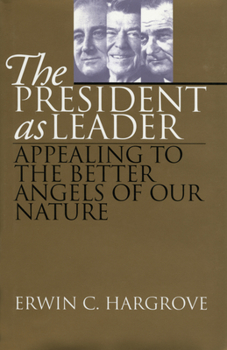The President as Leader: Appealing to the Better Angels of Our Nature
Select Format
Select Condition 
Book Overview
Few issues have clung to the presidency in recent years as tenaciously as that of moral leadership. This timely book, based on a lifetime of personal observation by an award-winning author, examines the politics of ideals to propose that, just as moral purpose without political craft is weak, political acumen without moral appeal is futile. Looking back to the timeless political theories of Aristotle and Machiavelli, Erwin C. Hargrove asks how presidents can most effectively combine political arts and skills with intellectual and moral leadership. He draws on his own scholarly research and synthesizes critical thinking about leadership--especially the point-counterpoint perspectives of Richard Neustadt and James MacGregor Burns. With insight and intelligence, he shows how effective leadership demands a judicious balance of commitment to the public good and an ability to discern the possibilities for political action at any moment. Hargrove argues that political leadership must contain a moral element if it is to be fully effective, and that a successful president must provide leadership in accord with the ideals embedded in American culture. To demonstrate this theory, he suggests a model with which to analyze, compare, and evaluate political leaders, and then assesses the presidencies of Franklin Roosevelt, Lyndon Johnson, and Ronald Reagan according to the model's normative implications. By examining the three presidents in terms of skill, character, cultural leadership, and other qualities, Hargrove extends his analysis beyond individual presidents to generate keen insights about presidential leadership in general. This thoughtful book clearly demonstrates that craft dissolves into cleverness without a clear sense of moral purpose, and that truth-telling, empowerment, and altruism in politics are not only desirable but achievable. The President as Leader is the capstone of a distinguished career, synthesizing years of observation and research about issues that occupy the thoughts of many Americans. In taking Lincoln's evocation of the better angels of our nature as a source of inspiration for his own reflections, Hargrove reminds us that we, as leaders, have the means before us to become better versions of ourselves.
Format:Hardcover
Language:English
ISBN:0700609008
ISBN13:9780700609000
Release Date:September 1998
Publisher:University Press of Kansas
Length:240 Pages
Weight:1.10 lbs.
Dimensions:1.0" x 5.8" x 8.8"
Customer Reviews
2 ratings
The nexus of theory and empirics
Published by Thriftbooks.com User , 21 years ago
This book is enormously interesting. The study of the presidency has evolved from biographical insights, to cumulative insight, to quantitative and formal modeling. Hargrove provides an interesting middle ground by constructing a foundation for analysis which harkens back to the big questions of politics (from Aristotelian rhetoric onward) and applies them to the study of the American presidency. Some insights are profound, others the stuff of common sense. Regardless, he provides a novel way to think about the presidency and does a great service to all who want to truly further their understanding of the institution.
Very good theory about the presidency
Published by Thriftbooks.com User , 24 years ago
While the book looks like a good deal of other theory books, it differs in that it is quite easy to read. Even though Hargrove's ideas sometimes seem like common sense, I've refered back to them on many occasions when reading about presidents and their actions. I recommend it to anyone who wants to further understand motives in the presidency.






